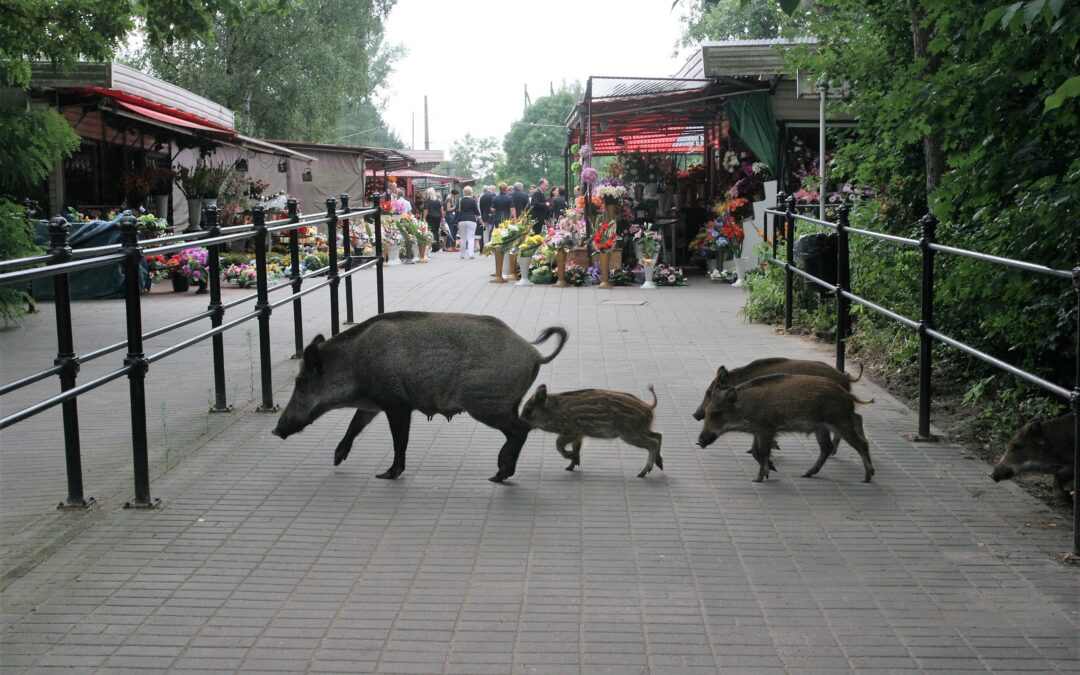Despite interventions from local authorities, the number of wild boars roaming the streets of the western Polish city of Poznań has rapidly increased over past years, spurring local groups to take on the city’s porcine peril.
“They no longer just migrate through Poznań – the boars now live here,” said Maciej Kubiak, coordinator of the Crisis Management Centre (CZK) in Poznań, quoted by Gazeta Wyborcza.
Every year over 550 boars are removed from the city, according to Poznań’s official website. Yet their urban population still remains around 200-250. Under African swine fever (ASF) regulations, following an outbreak last year, the maximum number is supposed to be 20.
Experts say that the animals are drawn in by the availability of food waste, milder climate, and general safety in urban areas. With fewer cars and people outside during the coronavirus pandemic, there have also been reports from around Poland of emboldened animals encroaching on urban areas.
“Before our very eyes, the wild pig is becoming an urban pig,” said Piotr Tryjanowski, a professor of zoology at the University of Life Sciences in Poznań, quoted by Gazeta Wyborcza.
He says that the reproduction cycle of wild boars has accelerated in recent years. “The maturing of boars has been speeding up, with sows getting pregnant two-three years earlier than before,” said Tryjanowski. Causes include milder winters in recent years and the effects of a changing diet, as boars now consume more corn.
While over the past decade there has not been a single incident of boars attacking humans in Poznań, they nonetheless make residents feel uncomfortable and unsafe.
A policeman was required to intervene after a wild boar entered a backyard where children were playing and ate their pierogi.
The police reassure that the offender is well known to them and is not aggressive, having become used to being fed by humans https://t.co/yShFzj84fV
— Notes from Poland 🇵🇱 (@notesfrompoland) June 5, 2020
A resident cited by Gazeta Wyborcza notes that he has spotted roaming animals more often in recent weeks. Their boorishness has not gone unnoticed, with reports of rummaging through garbage bins with such intensity that scraps can be found on the bonnets of nearby cars.
“That’s boars’ work,” concluded one resident.
Wild boars have previously been caught and transported outside of the city bounds. In recent months, however, due to the ASF epidemic, all culled or caught boars need to be tested, which significantly raises costs for the city and makes the catch less efficient.
The second solution – driving boars out – has also yielded limited results. “Boars are mobile animals. The vehicles of companies that scare off the animals do not have priority in traffic, and so sometimes it takes them around half an hour to reach the location. By that time the boars are gone, moving away, and later returning,” said Kubiak.
Około 5.05 rano. Przed Rondem ŚRÓDKA 😎😎😎
Opublikowany przez Roberta Puka Niedziela, 28 lipca 2019
Meanwhile, a final method, boar culls, are impossible in most areas of the city, since there is a legal requirement for the hunters to keep a 150 metre distance from any buildings and 500 metres from public gatherings when firing.
Following ineffectual actions by the authorities, local community groups have started acting on the hoof, pushing for more prevention.
“We don’t want to throw the boars out of the city, but rather to get them under control and encourage more responsible behaviours from residents. That’s the only way,” said Kubiak.
To discourage boars from approaching housing compounds, a number of bans have been put in place, including on the disposal of food scraps around buildings, bird feeding outside houses and planting “plants that boars find tasty,” reports Gazeta Wyborcza. Bins with biological waste are being locked up.
“We also have the green light to create luring areas, which entails scattering chestnuts and acorns, so that boars get used to being welcome on green patches,” said Kubiak.
Moreover, the community activists are now seeking to cooperate with allotment (działki) councils, so that they ensure that fences are mended and gates properly locked to limit the mobility of boars around the city.
Main image credit: Tomasz Kaminski / Agencja Gazeta

Maria Wilczek is deputy editor of Notes from Poland. She is a regular writer for The Times, The Economist and Al Jazeera English, and has also featured in Foreign Policy, Politico Europe, The Spectator and Gazeta Wyborcza.




















